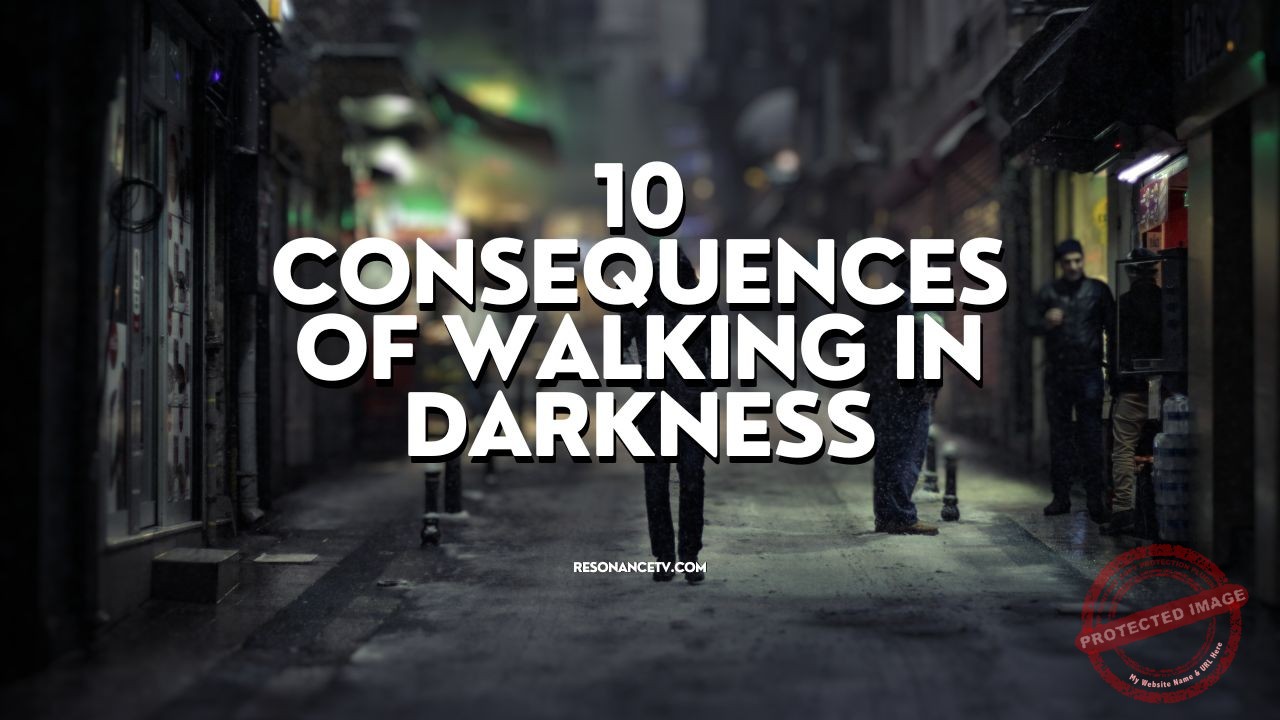Have you ever tried to navigate a room in pitch-black darkness? If you have, you’ll understand how frustrating and, at times, frightening it can be. You fumble, trip over unseen obstacles, and move slowly, uncertain of your way. It’s an experience that can be pretty unsettling. Just as this physical darkness can lead to confusion and stumbling, so can spiritual darkness in our lives. This blog post will delve into the ’10 Consequences of Walking in Darkness’ from a Christian perspective, enlightening our paths and helping us understand the dangerous pitfalls and detours that can trap us when we wander from the light of Christ’s teachings.
What are the consequences?
1. Spiritual Blindness. One of the primary and most profound consequences of walking in spiritual darkness is Spiritual Blindness. This is the inability to perceive, understand, and accept God’s truths. It symbolizes a separation from God, leading to a loss of moral and spiritual direction. In the Bible, spiritual blindness is well exemplified in the Pharaoh of Egypt (Exodus chapters 7-11). Despite witnessing the power of God through Moses’ miracles and plagues, Pharaoh’s heart was hardened, rendering him spiritually blind to God’s authority and the welfare of his people.
This blindness ultimately led to his downfall and the liberation of the Israelites. This spiritual blindness can affect us, closing our eyes to the love and truth of God and leaving us stumbling in the darkness of sin and ignorance. It underscores the importance of staying connected to God’s word and teachings, illuminating our paths, and opening our spiritual eyes to His divine truth and light.
10 Things God Wants You To Do That Are Simple
2. Loss of Direction. Loss of direction is another significant consequence of walking in spiritual darkness. When we distance ourselves from God’s word and Christ’s teachings, we often find ourselves lost, confused, and directionless. We can become disoriented in our spiritual journey like a traveler without a map or compass. The Bible provides a poignant example of this consequence in the story of the Prodigal Son (Luke 15:11-32). After demanding his inheritance from his father, the younger son strayed from his home and squandered all he had on reckless living.
This symbolizes how distancing oneself from God’s guidance can lead to a life of confusion, poor choices, and, ultimately, regret. Only when the son recognized his spiritual darkness and returned to his father (representing God) did he find direction and redemption. The story of King Solomon also illustrates this point. Despite being blessed with great wisdom and wealth, Solomon’s heart was led astray by his many foreign wives, who turned his heart towards other gods (1 Kings 11:1-13). His spiritual darkness ultimately led to a loss of divine favor and the division of the Kingdom of Israel.
3. Vulnerability to Temptation and Evil. Walking in spiritual darkness can increase our vulnerability to temptation and evil. Without God’s guidance, we can easily fall prey to sinful desires and negative influences, leading us away from righteousness. This vulnerability is often depicted in the Bible, with numerous characters succumbing to temptations when they stray from God’s path. In the Garden of Eden, we see that Eve was tempted when the serpent deceived her into eating the forbidden fruit (Genesis 3:1-7). This act of disobedience, stemming from her vulnerability to temptation, resulted in the fall of humanity into sin, demonstrating the severe consequences of spiritual darkness.
Judas Iscariot’s betrayal of Jesus (Matthew 26:14-16) is a stark reminder of the vulnerability to evil when one walks in spiritual darkness. Consumed by greed, Judas strayed from Jesus’ teachings and succumbed to the ultimate sin of betrayal, leading to his regret and tragic end. These biblical examples highlight the dangers of walking in spiritual darkness, emphasizing the importance of adhering to God’s teachings to resist temptations and evil. Like a shield against the fiery darts of the wicked, God’s Word can strengthen us, guide us, and protect us from falling into the pit of temptation and sin.

4. Alienation from God. Alienation from God is undeniably one of the most profound consequences of walking in spiritual darkness. This is a state of being separated or isolated from God, both relationally and spiritually, which can result from ignoring or rejecting God’s teachings and commandments. In the Bible, alienation from God is a recurring theme and is often associated with individuals or nations that have turned away from God’s laws. One notable example is in the Book of Isaiah, where the nation of Israel, despite being chosen by God, repeatedly turned away from Him and His laws, leading to their captivity and exile (Isaiah 1:2-4).
Their disobedience and idolatry, symbolizing their spiritual darkness, resulted in their alienation from God and the loss of their land and freedom. The Apostle Paul wrote about the Gentiles’ alienation from God due to their ignorance and hardness of heart in Ephesians 4:18. This alienation was only healed when they accepted Christ’s teachings and turned away from their old sinful ways, stepping out of spiritual darkness into Christ’s marvelous light.
5. Disconnection from The Faith. Disconnection from the faith is another grave consequence of walking in spiritual darkness. This usually occurs when one veers away from the teachings and principles of Christianity, resulting in spiritual disorientation and a weakened bond with God. This disconnection can leave a person spiritually emptied and devoid of the peace, joy, and hope of a steadfast faith. A compelling example in the Bible can be seen in the life of King Saul. Initially, Saul was chosen and anointed by God to lead Israel. Still, his disobedience and rebellion against God’s commands led him down a path of spiritual darkness, ultimately disconnecting him from his faith.
His spiritual decline was marked by paranoia, fear, and a sense of abandonment by God, which was a direct result of his disconnection from the faith (1 Samuel 16:14). In the New Testament, we encounter the example of Demas, a fellow worker of the Apostle Paul. Demas, who was once a genuine follower of Christ, allowed the world’s allure to draw him away from his faith. In 2 Timothy 4:10, Paul laments, “For Demas, in love with this present world, has deserted me and gone to Thessalonica.” This suggests that Demas had disconnected himself from the faith, falling prey to the spiritual darkness of worldly attractions.
6. Loss of Peace. Losing peace is one of the most profound consequences of walking in spiritual darkness. This loss can manifest as constant worry, fear, unrest, and inner turmoil, replacing the tranquility and serenity of spiritual enlightenment. The Bible, in numerous instances, expounds on this consequence. In the story of King Saul, his disobedience led him to disconnection from his faith and the loss of peace. His life became characterized by paranoia, fear, and a sense of abandonment by God (1 Samuel 16:14). Also, in the New Testament, the apostle Peter temporarily lost his spiritual peace when he began to sink while walking on water towards Jesus. His fear and doubt, symbolic of spiritual darkness, robbed him of his peace and caused him to falter (Matthew 14:22-33).
7. Hardening of Heart. A hardening of the heart represents a further devastating consequence of walking in spiritual darkness. It refers to a state wherein one becomes insensitive to God’s call and teaching, resulting in stubbornness and unrepentance. This hardening can lead to persistent disobedience and rebellion against God’s commandments. Biblically, one of the most striking examples can be seen in the story of Pharaoh during the time of Moses. Despite witnessing the power of God through the plagues inflicted upon Egypt, Pharaoh’s heart was hardened. He obstinately refused to let the Israelites go, displaying an unyielding resistance to God’s command (Exodus 7-11). Jesus warns about the danger of a hardened heart in the bible. He refers to people who have eyes yet fail to see and have ears yet fail to hear, symbolizing a spiritual hardness of heart that prevents them from accepting and understanding spiritual truths (Mark 8:17-18).

8. Hindered Spiritual Growth. Hindered Spiritual Growth is another critical consequence of walking in spiritual darkness. This refers to a stunting or stagnation in spiritual maturity and development. When walking in darkness, they are likely to struggle to develop the fruits of the Spirit (Galatians 5:22-23) and grow in the knowledge and grace of God. In the Bible, the parable of the sower provides a vivid illustration of this consequence (Matthew 13:3-23). The seeds that fell among the thorns represent those who hear God’s word, but the worries of life and the deceitfulness of wealth choke the word, making it unfruitful. This is indicative of hindered spiritual growth due to spiritual darkness. The Apostle Paul laments the spiritual immaturity of the Corinthian believers in 1 Corinthians 3:1-3. Despite being believers for some time, they were still living as ‘infants in Christ,’ unable to digest solid spiritual food and exhibiting worldly behavior. This serves as a potent example of how spiritual darkness can lead to stagnation in spiritual growth, preventing believers from maturing in their Christian walk.
See the 10 Characteristics of Faith (With Powerful Bible Verses)
9. Decreased Witnessing Power. Decreased witnessing power is a significant effect of living in spiritual darkness. Witnessing is a core function of a believer’s life, as it involves sharing the Gospel message and living in a way that reflects Christ’s love and teachings. Living in spiritual darkness can diminish this witnessing power, as it may result in a weakened relationship with God, compromised moral integrity, and a lessened motivation to share the Gospel with others. This spiritual condition can make one’s message less compelling and cause others to question the authenticity of their faith. A notable biblical example can be found in the life of Samson (Judges 13-16). Samson, a Nazirite set apart for God’s service, was empowered by God with extraordinary strength. He was to be a witness of God’s power to the Philistines.
However, Samson’s continual disobedience and pursuit of sinful pleasures led him into spiritual darkness, diminishing his strength and, consequently, his witnessing power. His life ended tragically, and his potential as a witness was largely unfulfilled. Before his transformation on the day of Pentecost, Peter provides another example. Despite being a close follower of Jesus, Peter’s spiritual darkness was exposed when he denied Jesus three times (Luke 22:54-62). This denial, driven by fear and self-preservation, showcased a stark contrast to Jesus’ teaching of self-denial and love. Peter’s witnessing power at that moment was significantly decreased. However, after receiving the Holy Spirit, Peter stepped out of spiritual darkness, and his witnessing power was dramatically restored, leading him to become a pillar in the early Christian church (Acts 2:14-41).
10. Loss of Eternal Rewards. Walking in spiritual darkness also results in the loss of eternal rewards. These rewards are the blessings, honors, and joys God promises to those who faithfully serve Him and live according to His commandments. When one chooses to walk in darkness, indulge in sinful practices, and neglect their spiritual responsibilities, they risk missing out on these eternal rewards. An example from the Bible can be found in the Parable of the Talents (Matthew 25:14-30). Here, Jesus tells the story of a master who entrusts his servants with varying numbers of talents (a form of currency) before leaving on a journey. Two of the servants invest and double their talents, but one buries his talent in the ground out of fear. Upon the master’s return, he rewards the first two servants for their faithfulness and diligent stewardship, but the third servant, who did nothing with his talent, is cast into outer darkness.
This parable illustrates that God rewards those who use their gifts and opportunities to serve Him faithfully. In contrast, those who hide or misuse their gifts out of fear or negligence may lose their potential eternal rewards. In the book of 1 Corinthians 3:10-15, the Apostle Paul talks about believers being rewarded for their works at the ‘Bema Seat’ of Christ. He warns that while every believer’s salvation is secure in Christ, the quality of their works will be tested by fire. Those works done with the right motive and for God’s glory will endure and receive a reward, while those done out of selfish ambition or in disobedience will be burned up, resulting in the loss of rewards. Hence, walking in spiritual darkness can lead to losing these potential eternal rewards, further underscoring the dire consequences of choosing such a path.
There are several actionable steps a Christian can take to ensure that they don’t walk in darkness:
- Prayer and Meditation: Regularly praying and meditating on God’s word can help foster a deeper connection with God. This spiritual discipline allows Christians to draw strength from God, seek His guidance, and obtain wisdom for daily living.
- Bible Study: Studying the Bible provides Christians with spiritual guidance and insight. The Bible is often called a lamp unto our feet and a light unto our path (Psalm 119:105). It provides the spiritual nourishment required to grow in faith and avoid the pitfalls of spiritual darkness.
- Fellowship with Other Believers: Regular fellowship with other believers can provide encouragement, accountability, and mutual edification. This community can support each other in their spiritual journey, providing advice, prayer, and support during challenging times (Hebrews 10:24-25).
- Embracing the Holy Spirit: The Holy Spirit is a guide and helper for Christians (John 16:13). Inviting and yielding to the Holy Spirit’s influence allows Christians to discern God’s will better and draw strength for their spiritual journey.
- Living out the Gospel: Applying the teachings of Jesus Christ in daily life can help Christians maintain a close walk with God. Jesus taught about love, forgiveness, humility, and self-sacrifice. Living out these virtues enriches personal spiritual growth and enhances the ability to witness to others effectively.
In conclusion, walking in spiritual darkness can have significant consequences for Christians, affecting their relationship with God, ability to witness effectively, and potential for eternal rewards. However, the path out of spiritual darkness is available to everyone. Through regular prayer and meditation, studying the Bible, fellowship with other believers, yielding to the Holy Spirit, and practicing the teachings of the Gospel in daily life, Christians can maintain a close walk with God, shining as lights in this world. While the journey may be challenging, the eternal rewards outweigh the hardships.
